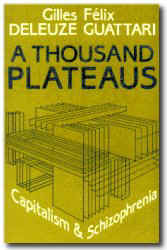 "There's no 'rationalist methodology' in A THOUSAND PLATEAUS. Just an orgy of concepts. Concepts aren't part of logical train of thought in Deleuze and Guattari; they're more like riffs in a guitar piece. Make that a cut of a wild electronica remix!"
"There's no 'rationalist methodology' in A THOUSAND PLATEAUS. Just an orgy of concepts. Concepts aren't part of logical train of thought in Deleuze and Guattari; they're more like riffs in a guitar piece. Make that a cut of a wild electronica remix!"No, Deleuze and Guattari are not members of the band...not exactly. Here's a list of their contributions (to the band and the world) sans rationalist methodology:
idiosynchratic vocabulary pre-conventional world of the unconscious disjointed random multiplicitous Dali-Freud-Kantian parody quasiphilosophy disjointed impenetrable postmodern sentiments
Ok, any questions? All right, let's back it up - beeeep beeeep beeeeep! Over the course of human history (that's right, we're backing it all the way up) the study of philosophy has been an outlet for whiney self-involved weirdos to bitch and moan about the meaning of life, thusly excusing them from manual labor. However, following some hundreds of years of investigation and incremental amassing of knowledge and understanding something happened. We reached a point as humans where we had finally accumulated so much learning that we could draw one conclusion: we ain't got a clue. This is referred to by Charles Young as the crisis of meaning - a psychologically violent moment of thrashing the drawing board clear, leaving behind depths of nothingness. This is kind of a spooky place for the philosophy train to deliver us ("End of the line!") Was it worth it? Have the thousands of years of philosophical tail-chasing all been for naught?

Clearly not, good friends! If nothing else, the progress (or digress) of philosophy has rendered at least one brilliant nugget of shiny goodness - "A Thousand Plateaus." This time I am referring to the band, not the text (referenced at top) from which the band has gleaned its name. Yes, like the text their lyrics are densely idiosychratic and more than a little referrential.
I recently had the opportunity to discuss this issue with a member of the band, Doug (keyboards, pictured). I mentioned to him that I had done a little investigating into the source of the band's new name, discovering that the philosophy text of the same title was regarded with some controversy. To my amusement, most of the reviews of the book were derogatory and undermining, stating it to be, effectively, Mumbo Jumbo. Poppycock. Balderdash. Doug told me that such a reaction made sense coming from 'outsiders' to (as I recall) continental philosophy.
Idiosynchratic vocabulary (read: made-up words, grammar, etc.) and obscured blurry concepts are indeed potential turn-offs for outsiders to philosophy, but what about music? Do approachable lyrics detract from the comment that "A Thousand Plateaus" is trying to make? If so, what exactly is that comment?
Non-sensical jackassery is certainly not it.
2 comments:
Joel, I've opened the comments up to registered users, so if you have a blogger sign-in go nuts.
Well, i had a masterfully crafted comment all geared up and ready to go before i figured out before that i couldn't comment. So you will just get the cliff notes version. First off i definitely understand your sentiment. The important thing to remember as far as lyrics goes, is that it is poetry. Granted poetry can suffer some of the same problems that you mention in your post. However if we think of lyrics in the context of poetry it is easier to highlight some important factors. One is audience is incredibly important. The kicker is that there are a vast range of types of audience members, smart ones, dumb ones, people who will get the inside jokes... I think what A Thousand Plateaus is trying to do is have a diverse selection of music that can hit as many different subsections of the audience as possible. The song Spice Coyote (aka Simple Sample) is purposefully unintelligable to the average listener. However if you know the back story it becomes even more meaningful (it means a lot to me). However the average listener still can partake in the word play, alliteration and form of the song while inventing their own meaning to the song. On the other hand the song "Pop Song" can fly under the guise of a straightforward song pretty easily. Oh and as far as the songs Aaron wrote well that IS quasiphilosophy disjointed impenetrable postmodern sentiments.
Post a Comment